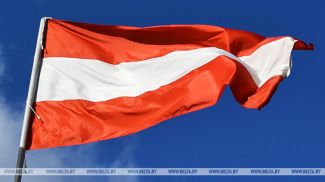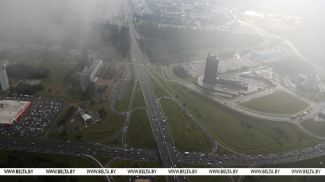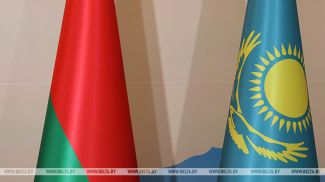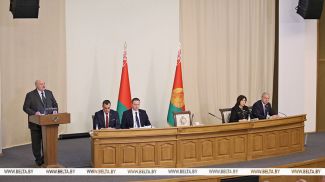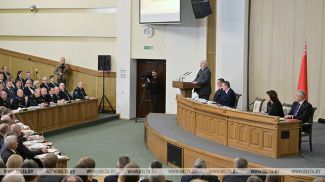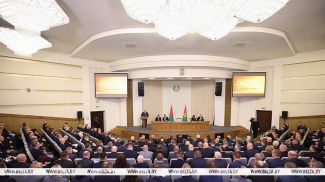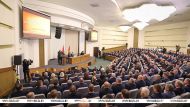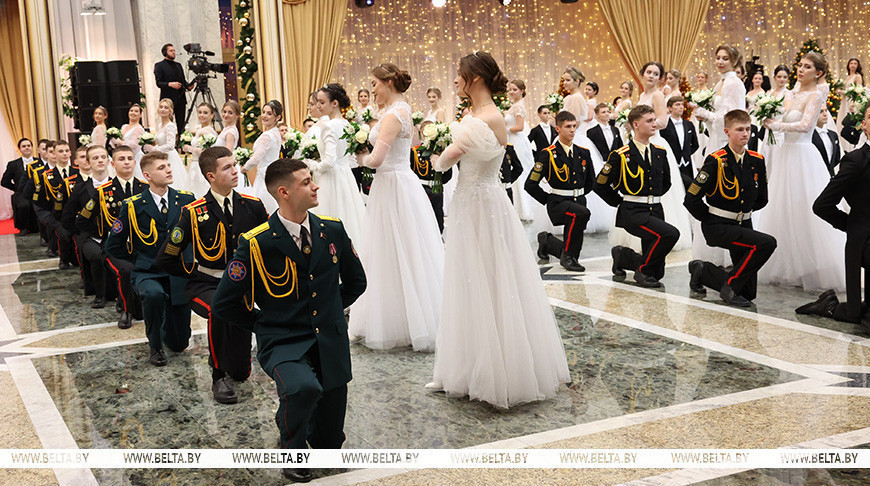
News of the story
"After the Fact: Lukashenko’s Decisions"
During the economic and political turbulence of the early 1990s, the Belarusian army was having a really tough time. The military profession gradually ceased to be prestigious, and some politicians started saying that Belarus did not need an army. They said that the army was soaking up huge resources, and it would be better to ask Europe and the United States for patronage and to let NATO in. They tried to humiliate the army and destroy it financially and morally. Such a campaign was very deliberate and pursued far-reaching goals: to make Belarus dependent, weak and defenseless. Moreover, the system began to erode - or rather, it began to be eroded from the very bottom. In this issue of BelTA's YouTube project “After the Fact: Lukashenko's Decisions” we will tell you what problem the military raised with Aleksandr Lukashenko in 1995 and why the president had to create a special commission to sort things out. You will find out who opens military parades in Belarus today and who is good not only at combat training, but also at the Viennese waltz.
History of the Minsk Suvorov Military School
To begin with, we need to go back in time, namely two and a half centuries back. A huge building on Maksim Bogdanovich Street is well known to every Minsk resident. It has been housing the Minsk Suvorov Military School for over 70 years. Established in the difficult post-war years, it became a home for children whose lives were shattered by the war.
However, the history of this place is much older than that. In 1771, a modest convent of the Catholic Mariavite Order was founded on the western slope of Trinity Hill in Minsk. In the Polish-Lithuanian Commonwealth, this order was responsible for female education. In addition, the nuns were supposed to take care of the poor and orphans. Several decades later, a stone convent and a hospital for the elderly, the poor, and illegitimate children were built on this site. When the convent was shut down, the building was bought by the Orthodox Church for the Minsk Theological Seminary. It is noteworthy that 12 of its graduates were canonized. Icons with their images are now kept in the church of the Minsk Suvorov Military School.
During the First World War, the Seraphim Hospital was moved from Moscow to Minsk. The military hospital located in this building treated soldiers and officers wounded on the battlefield. A few years later, the former cells of the Mariavites were taken by the military: the building was transferred to the United Belarusian Military School, where commanders for the cavalry, artillery and infantry were trained. Just imagine how many events these walls remember.
In 1943, the Soviet Union started opening Suvorov military schools for children of Red Army soldiers and partisans of the Great Patriotic War, as well as for orphans whose parents were murdered by the German occupiers. The leadership of Soviet Belarus submitted a request to open such a school on behalf of the military and workers. However, it was not until 1953 that such a school opened in Minsk. It welcomed its first students in the building we have described above. True, the building had to be completely rebuilt - in the Stalin's Empire style. It got new floors, and students moved into the former convent.

“The Minsk Suvorov Military School is a unique educational institution. First of all, because it trains future personnel for the Armed Forces and, in general, for national security institutions. In terms of its structure and infrastructure, the school differs from the majority of educational institutions and even cadet schools. We are very proud to teach in such a historical building that has housed various educational institutions, including very large military schools, throughout its history,”said Aleksei Osipov, Deputy Chief for Ideological Work of the Minsk Suvorov Military School.
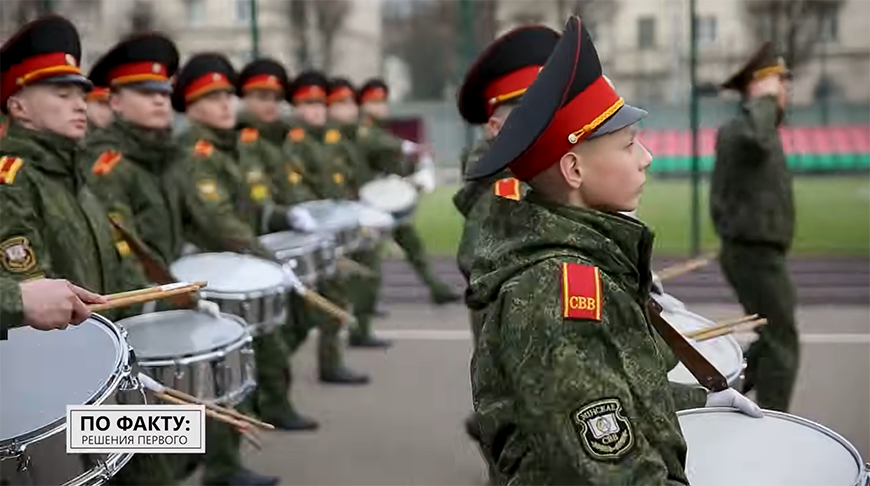
Why did Lukashenko decide keep the Minsk Suvorov Military School?
For many years, the Minsk Suvorov Military School was the center of military and patriotic education and was always among the leading educational institutions of Soviet Belarus. However, in the early 1990s, the school and the Belarusian army in general found themselves in a precarious state. Publications began to appear claiming that the school was very burdensome for the budget, that it was training too many students and that there was nowhere to place them for further education.
Soviet and Belarusian military commander Piotr Chaus recalls in his book that the Defense Ministry prepared an entirely arbitrary order to halve the school's contingent and relocate it to one of the barracks in a military town on the city outskirts. All of this could mean the collapse of the entire military education system in Belarus. In response, military personnel and alumni of the Minsk Suvorov Military School decided to appeal to the president, requesting to preserve the school and improve its training system.

President Aleksandr Lukashenko refrained from making rash decisions: he still adheres to this principle. The head of state instructed the Security Council to examine the issue and report on it. In the spring of 1995, the president established a special commission to study this complex situation and develop proposals for the future of the Suvorov school. The commission conducted extensive research, studied the development of Suvorov military schools since their inception and made the necessary calculations and substantiations. As a result, within a couple of months, a comprehensive document was submitted to the president, and Aleksandr Lukashenko signed the decree “On the Further Development of the Minsk Suvorov Military School”. The original organizational and personnel structure of the school was preserved with minor adjustments and additions made. Most importantly, the school was switching to a six-year program with revised curricula and schedules. Thus, the Minsk Suvorov Military School returned to its roots, initial goals, and objectives.

“One of the very first decisions I had to make as a fledgling president was about the Suvorov Military School. I spent a long time studying this issue, listening to different viewpoints. I clearly understood that we would never be able to restore the Suvorov school in Belarus (even if we need it). We can construct a building, even a better one, and recruit students, but we would lose what has already been created here: the spirit founded on traditions (including heroic ones) that were honored and preserved here. That was the main reason why I signed the decree and chose to retain the Suvorov Military School,” the president said during his visit to the Minsk Suvorov Military School in 2006.


“One of the very first decisions I had to make as a fledgling president was about the Suvorov Military School. I spent a long time studying this issue, listening to different viewpoints. I clearly understood that we would never be able to restore the Suvorov school in Belarus (even if we need it). We can construct a building, even a better one, and recruit students, but we would lose what has already been created here: the spirit founded on traditions (including heroic ones) that were honored and preserved here. That was the main reason why I signed the decree and chose to retain the Suvorov Military School,” the president said during his visit to the Minsk Suvorov Military School in 2006.


How to enter the Minsk Suvorov Military School
Today, the Minsk Suvorov Military School is one of the top educational institutions in the country in terms of the quality of secondary education. Its contribution to promoting patriotism in the younger generation and training future Belarusian officers cannot be overstated.
“The educational process at the Minsk Suvorov Military School involves active learning of the most interesting and modern subjects. To enter the school, you must pass exams. As a rule, our students are highly motivated, knowledgeable and performed pretty well academically at their previous schools. They take exams and are enrolled on a competitive basis. Annually, there are about three to four candidates for each spot,” Aleksei Osipov stressed.

In his words, interest in studying at the Suvorov school has increased recently. “A few years ago, the enrollment figures also increased. Nowadays, 104 students are admitted, which is 20 more than in previous years. The overwhelming majority of graduates of the Minsk Suvorov Military School - more than 80% - go on to become homeland defenders, serving in various national security organizations,” Aleksei Osipov noted.
Within the system of Soviet-era Suvorov schools, the Minsk Suvorov Military School earned a prestigious place, having been recognized as the best Suvorov school a dozen times. Today, it remains the only institution of this kind in the post-Soviet space, because here students are mentored by active-duty officers rather than retirees, reservists or civilians. This principle was one of the school’s traditions which has been preserved to this day. Unsurprisingly, the school boasts dynasties among its alumni.
For example, Nestor Skaliychuk is a fourth-year student, whose older brother is also a Suvorov student. Moreover, his great-uncles were educated here and later became generals.

“I plan to enroll in the Military Academy’s Aviation Faculty to become a helicopter pilot. I like the school because it offers advanced education compared to regular schools. The teaching is innovative, and we are always surrounded by a close-knit male team, standing shoulder to shoulder. Everyone is ready to help. The officers never abandon us either: they assist us and check on us,” he said.
Why Victory Day parades start with the Suvorov students' march
There is a long-standing tradition stemming from the Victory Parade of 1945: military students lead the march. These days, the parade commander from the Minsk garrison is followed by students of the Minsk Suvorov Military School during the march. Nestor was once lucky enough to be among them.
“I tried my best. It was hard, but we did our best to put up a great performance. When we finished the drum beating and turned our heads to the right, I looked at our head of state and I was happy to be honored to march in front of the president of our country. To be selected to take part in the parade you need to do well academically, get good marks and be healthy and fit enough. Since our drumming square march first, we play a major role in setting the pace and providing a cadence for all the marching units and also for the band to play a beautiful melody,” Nestor Skaliychuk stated.
Today, the Minsk Suvorov Military School is one of the top educational institutions in the country in terms of the quality of secondary education. Its contribution to promoting patriotism in the younger generation and training future Belarusian officers cannot be overstated.
“The educational process at the Minsk Suvorov Military School involves active learning of the most interesting and modern subjects. To enter the school, you must pass exams. As a rule, our students are highly motivated, knowledgeable and performed pretty well academically at their previous schools. They take exams and are enrolled on a competitive basis. Annually, there are about three to four candidates for each spot,” Aleksei Osipov stressed.

In his words, interest in studying at the Suvorov school has increased recently. “A few years ago, the enrollment figures also increased. Nowadays, 104 students are admitted, which is 20 more than in previous years. The overwhelming majority of graduates of the Minsk Suvorov Military School - more than 80% - go on to become homeland defenders, serving in various national security organizations,” Aleksei Osipov noted.
Within the system of Soviet-era Suvorov schools, the Minsk Suvorov Military School earned a prestigious place, having been recognized as the best Suvorov school a dozen times. Today, it remains the only institution of this kind in the post-Soviet space, because here students are mentored by active-duty officers rather than retirees, reservists or civilians. This principle was one of the school’s traditions which has been preserved to this day. Unsurprisingly, the school boasts dynasties among its alumni.
For example, Nestor Skaliychuk is a fourth-year student, whose older brother is also a Suvorov student. Moreover, his great-uncles were educated here and later became generals.

“I plan to enroll in the Military Academy’s Aviation Faculty to become a helicopter pilot. I like the school because it offers advanced education compared to regular schools. The teaching is innovative, and we are always surrounded by a close-knit male team, standing shoulder to shoulder. Everyone is ready to help. The officers never abandon us either: they assist us and check on us,” he said.
Why Victory Day parades start with the Suvorov students' march
There is a long-standing tradition stemming from the Victory Parade of 1945: military students lead the march. These days, the parade commander from the Minsk garrison is followed by students of the Minsk Suvorov Military School during the march. Nestor was once lucky enough to be among them.
“I tried my best. It was hard, but we did our best to put up a great performance. When we finished the drum beating and turned our heads to the right, I looked at our head of state and I was happy to be honored to march in front of the president of our country. To be selected to take part in the parade you need to do well academically, get good marks and be healthy and fit enough. Since our drumming square march first, we play a major role in setting the pace and providing a cadence for all the marching units and also for the band to play a beautiful melody,” Nestor Skaliychuk stated.


Aleksandr Lukashenko attends a military parade marking the 80th anniversary of Belarus' liberation from the Nazis, 3 July 2024
It is an interesting fact after that seeing it in person, many boys start dreaming of entering the Suvorov Military School. A parade is always a beautiful, emotional and solemn event.
“On 3 July 2020, my brother, my father and I were watching the parade and saw students from the Suvorov Military School marching. We got very interested and decided to enroll,” Artur Smolsky and Artyom Smolsky, students of the Minsk Suvorov Military School said. “Students of the Suvorov Military School open the parade. They have the hardest task. They march first, drumming. They need to stay in step. It is actually difficult to do. You have to train very hard to perform well.”
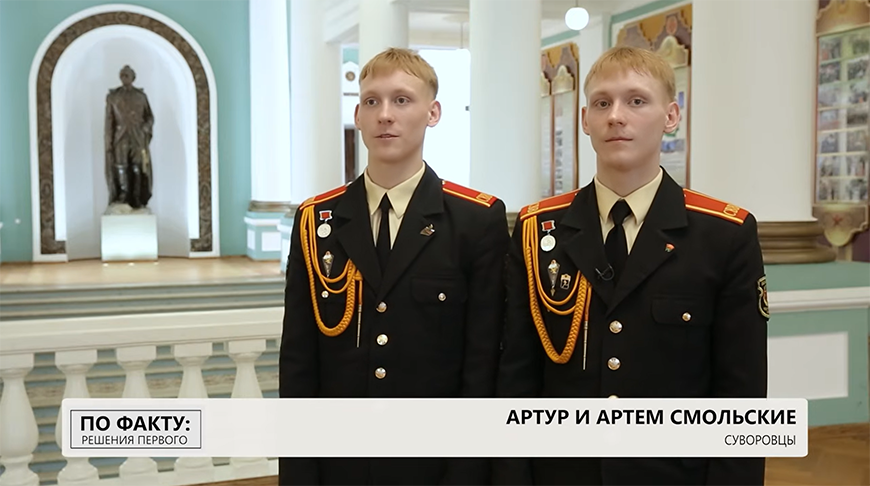
At first their friends did not believe that the young men would enter the school. When Artur and Artyom got enrolled, their friends were surprised and happy for them.
Minsk Suvorov Military School advantages
In just a couple of months, Artur and Artyom will graduate from the military school. Like the vast majority of Suvorov military school students, they see their future careers in the Armed Forces. The brothers have decided to follow in their uncle's footsteps and enter the Ryazan Guards Higher Airborne Command School. Of course, later they will use their knowledge to the benefit of the Belarusian army. They have already tried their hand at paratrooping. The young men have already performed one parachute jump each and are gearing up for more.
“The level of education in the Suvorov military school is certainly different from that of a regular secondary school,” Artur said.
Artyom added: “In addition to secondary education, students of the Suvorov military school also receive military training. We are taught ethics, aesthetics, dancing. We participate in various balls. Here we can also get a Category B driving license. The Suvorov military school presents a perfect opportunity for a boy to get military training, to become independent and to grow into a real man.”
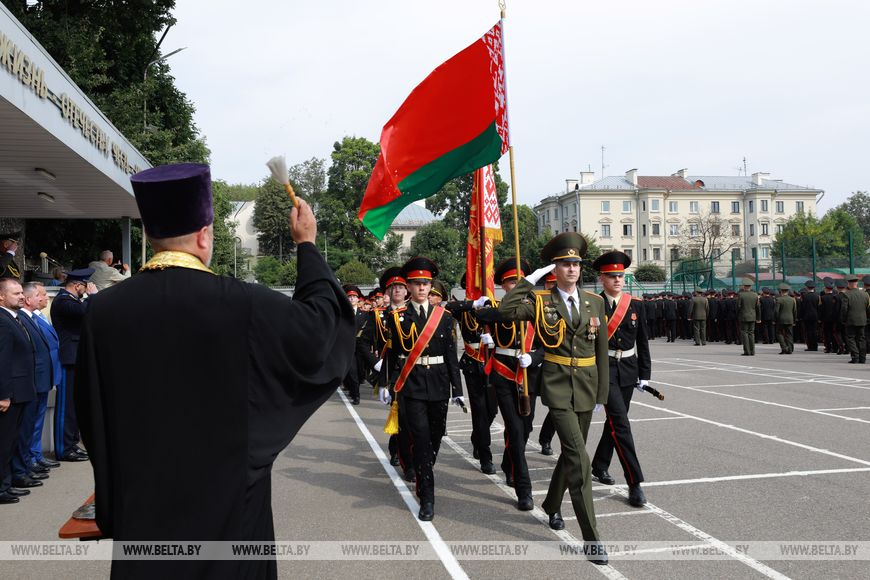
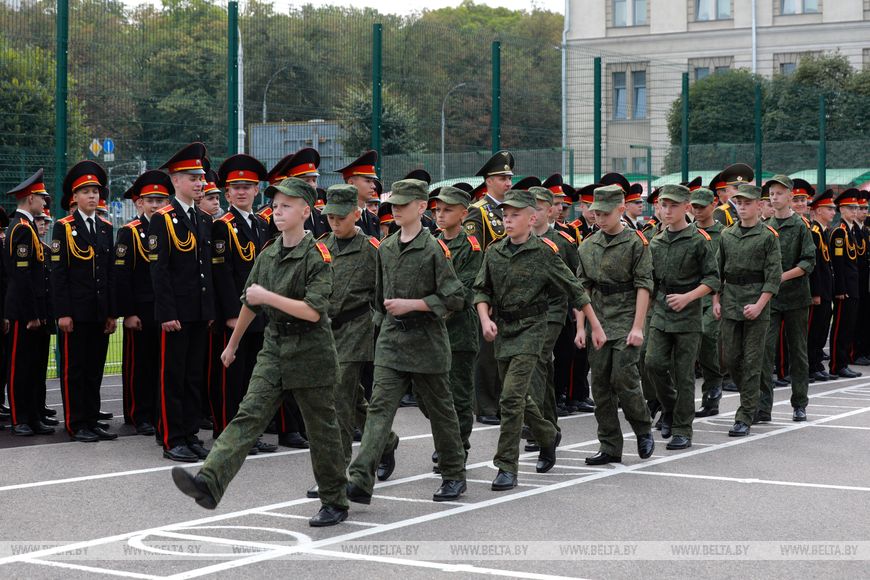
Is it hard to study at Suvorov Military School?
Over more than 70 years of its existence, this military school has trained 13,000 young men. Every student of the Suvorov military school receives exceptional physical training, learns Viennese Waltz dancing skills, rules of etiquette and nice manners.
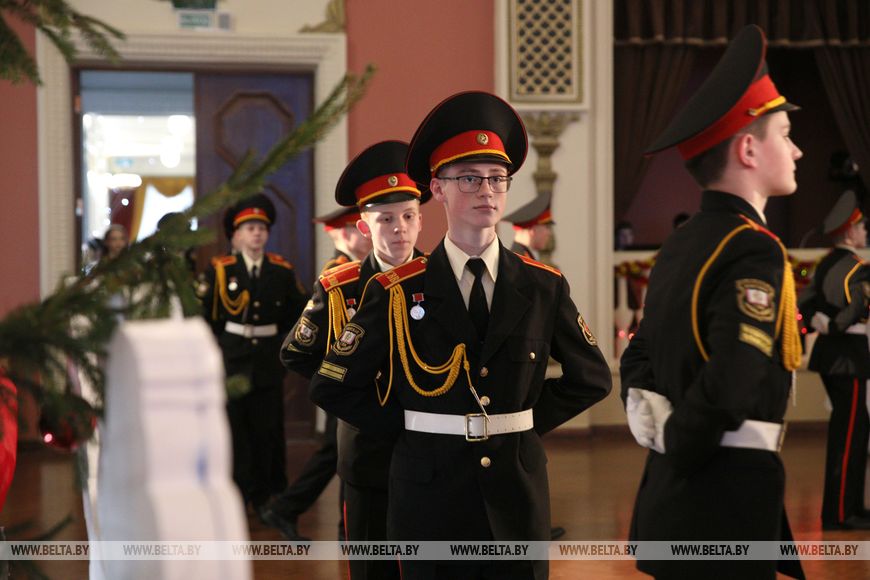
“I have always wanted to become an officer, as I have always been inspired by people in uniform. Any officer is an honest, responsive, self-sufficient person. You look at such people and realize that you want to be like them. An officer is brave, always ready to help in any situation. This is actually a very important trait for a person. I feel that I have already learned to be much more independent, much more serious. The things I have already learned in the Suvorov military school cannot be learned in any other school,” Roman Voloshin, a student of the Minsk Suvorov Military School said.
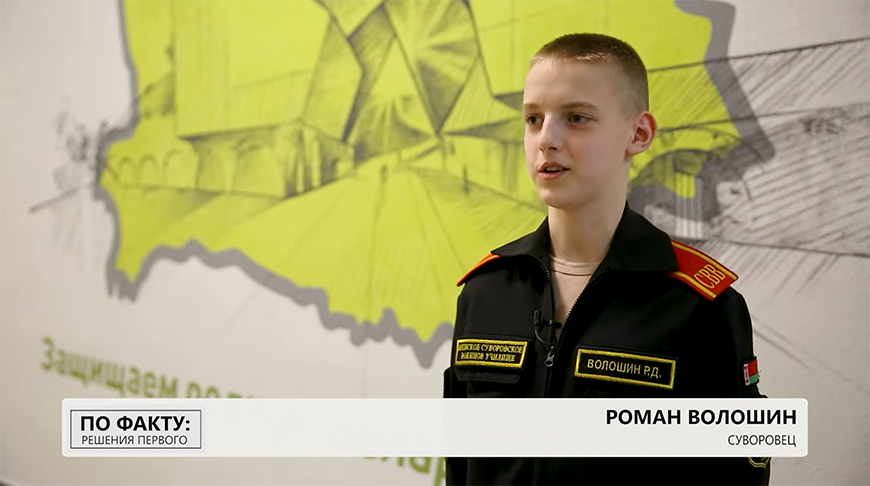
Roman Voloshin is in his first year. Among the challenges Roman names the need to stay away from home. Freshmen, however can go home every weekend, so they adapt to independent life quite quickly.
“We have four sleeping quarters – for four platoons. Each quarter accommodates 26 students. At first it is unusual to sleep in one space with so many people, but you get used to it with time. You spend five days a week in these quarters. You get closer to the team, to your friends. It is cool,” the student said.
Students pull duty from their first year at school. Being on duty at the Suvorov Military School differs from that in military units. They sleep at night. There is no need to stay awake until morning. Important classes are not to be missed either.
“It's also important to keep the premises clean,” Roman said.
What Lukashenko calls the foundation of education
The head of state is confident that the Motherland must be defended by all those who live on this land. “God forbid a conflict erupts - half of men do not know what a weapon is and how to use it. Therefore, at least men [should learn it], though we have long had a mixed-gender army. Female military personnel have added a noticeable feminine touch to the Armed Forces. Nevertheless, from time immemorial a man must defend his Fatherland, his family and his woman. This is how it has always been in our history, and not only ours,” Aleksandr Lukashenko once said.
The president also stressed on another occasion: “Patriotism lies at the heart of education. A lot has been done. We can talk about concrete results. We see high competition for a spot in military schools. We see the growing interest of young Belarusians in search and recovery of remains of fallen WW2 soldiers, in the student volunteer movement. The number of school graduates who leave Belarus to study abroad is falling. The work needs to continue. Remember that only patriots can raise a patriot,” the Belarusian leader said.
During a visit to the Suvorov military school in 2006 Aleksandr Lukashenko signed a book of distinguished visitors. The president wrote: “Suvorov military school students have always served as an example of outstanding academic achievements, high culture, nobility, duty and honor. Our nation needs highly professional officers devoted to the interests of the state and possessing the knowledge of modern military science. You are to take the most active part in strengthening the defense capability of the country, in building a strong and prosperous Belarus. Be proud of the high and honorable title of a graduate of the Suvorov military school.”
The young patriots are following this message.




